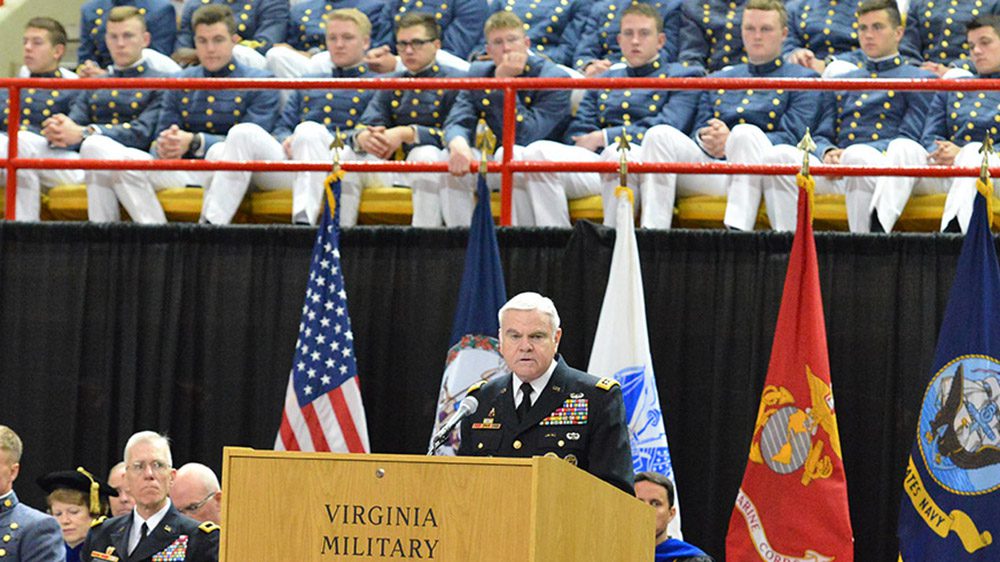A Recognition of Service to VMI and Our Nation

Gen. J.H. Binford Peay III ’62, superintendent 2003-2020, during the 2016 commencement ceremony.—VMI Photo by Kelly Nye.

Gen. J.H. Binford Peay III ’62, superintendent 2003-2020, during the 2016 commencement ceremony.—VMI Photo by Kelly Nye.
Published: October 31, 2020
On Oct. 26, 2020, Gen. J.H. Binford Peay III, VMI Class of 1962, completed almost six decades of honorable and distinguished service to the country and the Commonwealth.
For 35 years, Gen. Peay was an officer in the United States Army. He served twice in Vietnam and was wounded in action. He led the famous 101st Airborne (Air Assault) Division in Operation Desert Shield/Desert Storm and served as Vice Chief of Staff of the Army and Commander-in-Chief, U.S. Central Command. Through this service, he continued the tradition of senior-level military command by VMI alumni—as exemplified by George C. Marshall, VMI Class of 1901—and his service brought great credit to the Institute.
The son of an alumnus and the father of two alumni, after he left active duty, Gen. Peay served VMI as a trustee of the VMI Foundation, beginning in 1998.
In 2003, after an intensive nationwide search, the Board of Visitors named Gen. Peay as the Institute’s 14th superintendent.
Immediately, Gen. Peay began a thorough and rigorous assessment of every aspect of the Institute’s operations and environment. Its purpose was to determine what VMI needed to do in order to continue its proud tradition of graduating citizen-soldiers of ability, determination, and honor ready for lives of success in their chosen careers and service to the country.
This effort generated the Institute’s master plan, Vision 2039, under which VMI has made extraordinary progress. It has improved every aspect of the academic program: New majors and minors have been introduced; departments have been revamped; and the Institute’s already formidable engineering, science, and mathematics programs have been enhanced. It expanded opportunities for cadets to engage in meaningful research as well as international study. It strengthened the support of the dedicated and skilled men and women who make up its faculty.
VMI also improved its athletic programs. It recruited coaches and staff who are committed to winning with good sportsmanship and are devoted to the young men and women who represent the Institute as cadet-athletes and to their development as athletes, students, and cadets.
Under Vision 2039, VMI committed itself to improve the physical environment in which cadets live and learn. In the past 17 years, thanks to the support of the Commonwealth, new facilities—e.g., the third barracks and the Corps Physical Fitness Center—and many of its already existing facilities were renovated and expanded.
Throughout his tenure as superintendent, therefore, Gen. Peay was devoted to creating and maintaining an environment dedicated to the constant pursuit of excellence in which cadets are provided opportunity to push beyond their self-perceived limits, to test themselves at all levels and to develop the traits of successful leadership—honor, respect, civility, self-discipline, and professionalism. The success of his approach is evident in the marked ability of cadets to plan and run complex operations daily at the Institute and beyond.
VMI, like the rest of the nation, is an ever-evolving environment as we have strived toward a more perfect VMI. There was great adaptation and progress under Gen. Peay’s leadership and there will continue to be in the future. Work has already begun on Gen. Peay’s five-pillar plan outlining the “Way Forward for Greater Understanding, Fairness, and Equality.”
Thanks to Gen. Peay’s tireless efforts and his bold leadership—the leading characteristics of which were vision, devotion, energy, and integrity—VMI has been on a transformational climb. It carries a national reputation for excellence and moved into the top tier of American higher education.
Gen. Peay was not alone. At his side, every step of the way was his wonderful wife, Pamela. Her obvious love for the Institute was only equaled by her husband. She was a model first lady and beloved by the Corps of Cadets. Gen. Peay was also supported on post by a dedicated faculty and staff. Off post, he forged enduring partnerships with members of the General Assembly and other public leaders and was VMI’s most effective advocate. He inspired countless alumni, parents, and friends to devote their time, talents, and treasure to supporting VMI.
The enduring legacy of Gen. Peay will be a college that will continue to strive to provide our country and Commonwealth with effective and honorable leaders and in which every Virginian and every American can take an honest pride.
We thank him profoundly for his selfless and honorable service to the Virginia Military Institute, the Commonwealth of Virginia, and the United States of America.